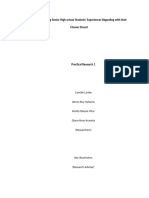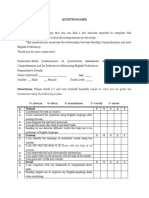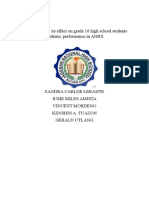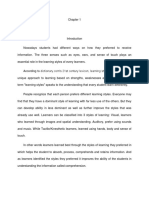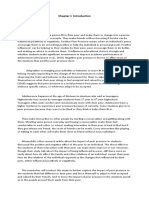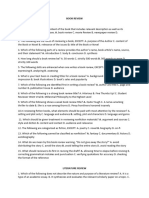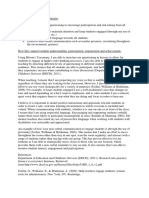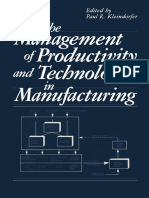Question
Uploaded by
Christian Jay VenceQuestion
Uploaded by
Christian Jay VenceQuestionnaire
Classroom Survey
English Education Master Students’ Attributional Beliefs in Their Academic Reading Venture
Dear friends,
Werner (1985) defines attributional beliefs as people’s capabilities to assume or judge varied
causes prompting various intended behaviors. Concerning this matter, university EFL learners
are widely expected to attribute their specific academic reading skills development as a tangible
result of their expendable efforts instead of perceiving it as a fixed reading incompetency. This
Likert-Scale questionnaire was created to profoundly investigate English Education Master
Students’ Attributional Beliefs in Their Academic Reading Venture. Specifically, a group of
these statements were adapted from attributional beliefs and reading comprehension
questionnaire designed by Florida and Mbato (2020). The recorded responses to this
questionnaire will be utilized for the sake of research publication. Thus, all of the responses will
be kept confidential. The researcher hoped that honest responses can be given in order to
ascertain the robustness of the data used for this study. The Likert-Scale questionnaire consisted
of 10 statements and the participants are allowed to select these four following categories
(Strongly Disagree, Disagree, Agree, and Strongly Agree). The participants may need around 10-
15 minutes to fill out this questionnaire. Thank you in advance for dedicating your valuable time
to help me.
Name:
The statements below are concerned with your attributional SD D A SA
beliefs specifically utilized when engaging in academic reading
enterprises. For each of the remaining statements, please circle
a number that best states your opinions (1–4).
1= strongly disagree, 2= disagree, 3= agree, 4= strongly agree
I possess developing reading comprehension skills in my
1 1 2 3 4
academic reading.
I experience little reading progress during engaging in
2 1 2 3 4
academic reading learning venture.
I am not good enough in reciting the major important ideas
3 1 2 3 4
discovered in my academic reading texts.
I frequently feel demotivated whenever I encounter
4 difficult words or expressions in my academic reading 1 2 3 4
texts.
I merely follow my academic reading texts without raising
5 up critical questions potentially helping me to possess 1 2 3 4
better understanding of my targeted texts.
I continuously create some concise mind-mappings
6 beneficial for deepening my existing understanding of the 1 2 3 4
academic reading texts.
Whenever I give up on the thorny academic reading
7 processes, I elevate my reading endeavor repeatedly by 1 2 3 4
saying “I can tackle all of these challenges well.”
8 When I confront with unfamiliar words or sentences in my 1 2 3 4
academic reading texts, I determine to utilize guessing
meaning from the contexts strategies through some
essential keywords.
I continuously share my academic reading impediments
9 with some trusted fellow classmates in order to resolve the 1 2 3 4
specific intended reading learning issues altogether.
I consistently harness a vast range of academic reading
1 resources like dictionary, other relevant texts, and
1 2 3 4
0 credential website to figure out the most efficient strategies
to overcome my reading comprehension issues.
You might also like
- The Wyoming Legislature: A Citizen Guide To100% (1)The Wyoming Legislature: A Citizen Guide To24 pages
- Dodge Neon SRT-4: N2MB WOT Box Installation InstructionsNo ratings yetDodge Neon SRT-4: N2MB WOT Box Installation Instructions8 pages
- Exploring Senior High School Students' Experiences Regarding With Their Chosen StrandNo ratings yetExploring Senior High School Students' Experiences Regarding With Their Chosen Strand9 pages
- Questionnaire: Based On What You Do Given The Statements Using The Following ScalesNo ratings yetQuestionnaire: Based On What You Do Given The Statements Using The Following Scales2 pages
- Procrastination and Its Relationship To The Academic Burnout of Freshmen College StudentsNo ratings yetProcrastination and Its Relationship To The Academic Burnout of Freshmen College Students7 pages
- The Effect of Social Class On The Academic Performance of Grade 12 Students of SJNHS Clemente Mariñas VillaranteNo ratings yetThe Effect of Social Class On The Academic Performance of Grade 12 Students of SJNHS Clemente Mariñas Villarante47 pages
- Performance of College Students: Impact of Study Time and Study HabitsNo ratings yetPerformance of College Students: Impact of Study Time and Study Habits12 pages
- (2024) The Effects of Reading Habits On Academic - Performance Among Students in An ESL - Classroom - A Literature Review PaperNo ratings yet(2024) The Effects of Reading Habits On Academic - Performance Among Students in An ESL - Classroom - A Literature Review Paper14 pages
- Study Habits of Senior High Humss Students in Relation To Their Mathematics Academic PerformanceNo ratings yetStudy Habits of Senior High Humss Students in Relation To Their Mathematics Academic Performance5 pages
- Enhancing Communication Skills and Self Confidence of Aspiring Teachers of Grade 12 HUMSS and GAS Students at SJABNo ratings yetEnhancing Communication Skills and Self Confidence of Aspiring Teachers of Grade 12 HUMSS and GAS Students at SJAB37 pages
- Difference Between Holistic Thinking and Partial Thinking0% (1)Difference Between Holistic Thinking and Partial Thinking5 pages
- Level of Academic Performance of Grade 12 Humss Students of A Private Educational Institution in Central NegrosNo ratings yetLevel of Academic Performance of Grade 12 Humss Students of A Private Educational Institution in Central Negros5 pages
- Guidelines For Chapter 1 To 5 Body of Research100% (1)Guidelines For Chapter 1 To 5 Body of Research17 pages
- B.1 Survey Questionnaires For The LearnersNo ratings yetB.1 Survey Questionnaires For The Learners2 pages
- Research Questionnaire About Academic StressNo ratings yetResearch Questionnaire About Academic Stress5 pages
- Factors-that-Influence-the-Writing-Skills-of-HUMSS-Students-1-1No ratings yetFactors-that-Influence-the-Writing-Skills-of-HUMSS-Students-1-17 pages
- Academic Coping Strategies of Grade 7 Students in The Division of Lipa City - Dr. Ernesto P. Badillo-Keywords: Academic, Coping Strategies, Lipa CityNo ratings yetAcademic Coping Strategies of Grade 7 Students in The Division of Lipa City - Dr. Ernesto P. Badillo-Keywords: Academic, Coping Strategies, Lipa City9 pages
- III - Group 4, The Impact of Classroom Env. To Acad. Perf. of StudentsNo ratings yetIII - Group 4, The Impact of Classroom Env. To Acad. Perf. of Students15 pages
- This Study Resource Was: Mil Module 2 Lesson 1No ratings yetThis Study Resource Was: Mil Module 2 Lesson 13 pages
- Academic Text Reading Skills of Senior High School Students of Batangas City100% (1)Academic Text Reading Skills of Senior High School Students of Batangas City9 pages
- Exploring The Relationship Between Reading Comprehension Skills and Academic Performance Among UV-D Education StudentsNo ratings yetExploring The Relationship Between Reading Comprehension Skills and Academic Performance Among UV-D Education Students14 pages
- Topic Research Worksheet: Examples of Acceptable Internet SourcesNo ratings yetTopic Research Worksheet: Examples of Acceptable Internet Sources16 pages
- Does Academic Qualification Ensure Success?No ratings yetDoes Academic Qualification Ensure Success?4 pages
- My Social Upbringing: It Shows Me That Peer Relationships Influence My Growth of Personality and Self-ConceptNo ratings yetMy Social Upbringing: It Shows Me That Peer Relationships Influence My Growth of Personality and Self-Concept2 pages
- Modern Era: Module: Hcma22 - Contemporary Music and ArtsNo ratings yetModern Era: Module: Hcma22 - Contemporary Music and Arts10 pages
- Impact of Peer Pressure To Grade 10 Students in Their English Performances 2No ratings yetImpact of Peer Pressure To Grade 10 Students in Their English Performances 24 pages
- Review of Related Literature and StudiesNo ratings yetReview of Related Literature and Studies15 pages
- The Effects of Parenting Style To The Mental Health of Junior High School StudentsNo ratings yetThe Effects of Parenting Style To The Mental Health of Junior High School Students17 pages
- An Exploration On The Experiences of Grade 11 Academic Track Students Taking Modular Classes100% (1)An Exploration On The Experiences of Grade 11 Academic Track Students Taking Modular Classes26 pages
- Difficulties of Speaking English That Encountered Students Case Study en Nuhud Secondary SchoolsNo ratings yetDifficulties of Speaking English That Encountered Students Case Study en Nuhud Secondary Schools24 pages
- Ecols St. Brgy. Commonwealth, Quezon City: Commonwealth High School Senior High DepartmentNo ratings yetEcols St. Brgy. Commonwealth, Quezon City: Commonwealth High School Senior High Department19 pages
- Theoretical Foundations of Culture, Society and PoliticsNo ratings yetTheoretical Foundations of Culture, Society and Politics25 pages
- Emotional Intelligence and Academic Self Regulation Among Accountancy Business and Management Abm Students of Liceo de DavaoNo ratings yetEmotional Intelligence and Academic Self Regulation Among Accountancy Business and Management Abm Students of Liceo de Davao28 pages
- Analysis of Synchronous Generator Internal Insulation Failures100% (2)Analysis of Synchronous Generator Internal Insulation Failures5 pages
- +2 English: Be Confident Model Public Exam - March 2023No ratings yet+2 English: Be Confident Model Public Exam - March 202319 pages
- The Management of Productivity and Technology in Manufacturing PDF100% (2)The Management of Productivity and Technology in Manufacturing PDF333 pages
- Sample Clil Lesson Plan - Primary School ArtNo ratings yetSample Clil Lesson Plan - Primary School Art4 pages
- Mina Petrila-Spatiu Exterior 2 - 14 03 2024-ModelNo ratings yetMina Petrila-Spatiu Exterior 2 - 14 03 2024-Model1 page
- Orthoptic Exercises Information Leaflet: OphthalmologyNo ratings yetOrthoptic Exercises Information Leaflet: Ophthalmology5 pages
- Built-In Power Supply Photoelectric SensorNo ratings yetBuilt-In Power Supply Photoelectric Sensor16 pages




